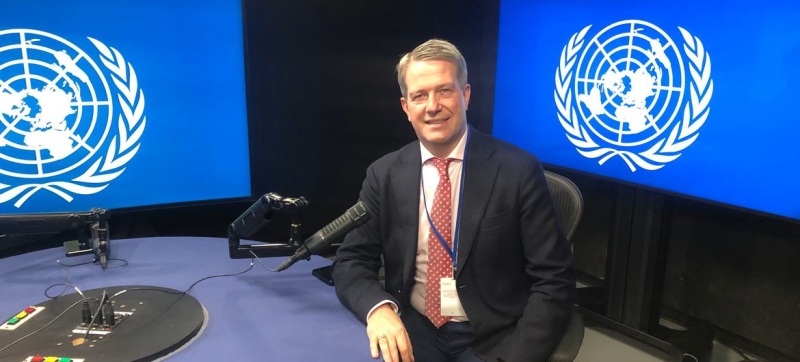
Night view of New York. INTERVIEW | Tchaikovsky and America aroused mutual admiration Culture and education
When Pyotr Ilyich Tchaikovsky came to New York in 1981, he was surprised by his popularity with the American public, Denis von Meck, a descendant of the great composer, told the UN News Service in an interview. He gave a lecture at the UN headquarters about Tchaikovsky’s trip to the United States. The event was organized by the Russian Mission to the UN. Lyudmila Blagonravova asked von Meck more about his relationship with Tchaikovsky and how the composer ended up in the United States.
DM:I am the great-great-great-grandnephew of Pyotr Ilyich. What does this mean? He had no children of his own. The closest descendants that he could have are nephews and nieces, children of brothers and sisters. His sister Alexandra Ilyinichna Tchaikovskaya, married name Davydova, is my great-great-great-grandmother. And my great-great-great-grandmother Nadezhda Filaretovna von Meck is exactly the same. She has a German surname, but is Russian, Orthodox, born Fralovskaya, who was Tchaikovsky’s closest friend and patron.
Having such blood – of both – it is simply criminal not to study [their biographies]. And when I did, I saw great interest from people. And it turns out that I am invited to many places. And, in fact, probably 90 percent of my time is now spent in all sorts of meetings on the topic of our cultural heritage.
LB: When you talk about Tchaikovsky, give lectures, what sources do you use?
DM:This is a very good question. The sources on Tchaikovsky are very voluminous. First of all, this is what he wrote in his diaries. He had 11 diaries, he has a huge number of musical criticism articles. He has textbooks, he has letters. Letters are the largest part of the literary and epistolary heritage, which is published in 18 volumes, the complete collected works.
He had 11 diaries, he has a huge number of musical criticism articles
This is the main and probably the most verified source. In addition to this, of course, there are the memoirs of other people. In addition, there are media outlets that wrote something about him. There are a huge number of works by musicologists, but I am more involved in biography than musicology. I am an engineer by education, I do not take up music, study and judge.
What I have listed is a huge amount of data on Tchaikovsky that needs to be studied in detail in order to draw any conclusions.
LB: The main topic of your lecture at the UN headquarters was Tchaikovsky’s trip to the United States. Tell us more about it. How did it happen that he ended up here??
DM: The thing is that people who wanted to develop music in the United States and, in particular, in New York, saw a lack of high-quality and large halls. And so, active people, these were several people from the musical society, approached the famous patron of the time, Andrew Carnegie, with the idea of building a new large concert hall. He was more interested in and helped literary work: he built libraries.
But his wife was known as a music lover, and through his wife they tried to influence Andrew Carnegie and generate interest in this idea. And they succeeded. Thus they built this magnificent building [Carnegie Hall – ed.], which is now famous throughout the world.
It was a risky venture. In those years it was not in the city center, but very far from the city center, and there were no such wonderful roads. They were afraid that few people would come there, if they came at all. So they decided to invite Tchaikovsky to the opening. And, in fact, it was not only the opening day, but it was a five-day festival, at which Tchaikovsky as a conductor performed his and other works. That is, they chose the most famous musician in the world, Pyotr Ilyich Tchaikovsky, who agreed to come here by invitation.

Denis von Meck in the UN News Service studio.
Tchaikovsky was a conductor, a composer, and a great Russian who always spoke with gratitude about his country. For example, when he performed in Prague and there was an hour-long ovation, he wrote in his diary: “There was a lot of delight, but all this was not for me, but for Mother Russia.”
LB: You said “the most famous musician in the world.” So it turns out that at that time he was already known and popular in the USA. And how did this interest appear here, considering that it was the 19th century and there was no Internet or sound recording?
DM: This is indeed a fair question. And it was a matter of chance. When Pyotr Ilyich composed his piece, which is now known as the First Piano Concerto, he dedicated it to his supervisor, for whom he worked, Nikolai Grigorievich Rubinstein, an outstanding pianist. But he did not agree with this piece, demanded that it be redone. Pyotr Ilyich refused, and Nikolai Grigorievich Rubinstein refused to perform it. And then Pyotr Ilyich turned to several musicians, including Hans von Bülow, a German conductor and pianist, who liked this piece very much.
He took it upon himself to perform it and performed it for the first time – I don’t know exactly why, but it happened that way – in Boston, in America, and the second time in New York. And in New York, one of the outstanding German conductors and musicians of that time, Walter Damrosch, heard this piece, he liked it very much, he began to popularize it, and began to ask Pyotr Ilyich Tchaikovsky for more music through letters.
Tchaikovsky was literally surprised at how well-known and popular he was – certainly more than in Europe and perhaps even more than in Russia
And thus, year after year, he introduced more and more of Tchaikovsky’s works into musical circulation, so to speak, in the USA. And Tchaikovsky was literally surprised at how famous and popular he was – certainly more than in Europe and perhaps even more than in Russia.
And this was confirmed by the choice. He was invited here as a foreign composer and conductor known specifically in America. And everything that happened here was perceived by Pyotr Ilyich with surprise, but it was a very pleasant surprise. And he left great memories, very positive ones, about America, and America was full of words of admiration for Tchaikovsky. He received letters from all over the country asking for autographs. That is, he was popular not only in New York.
LB: If you look at the Wikipedia article about Tchaikovsky in English, there is some audio recording with Tchaikovsky’s voice. I wanted to ask you, as a person who studies everything related to Tchaikovsky in detail, could this be an authentic recording?
DM: Yes, yes, these were just beginning to appear towards the end of Pyotr Ilyich’s life – I’ll remind you that he was born in 1840 and died in 1983 – the first means of recording sounds, so to speak, which were tested, including by Tchaikovsky and several people in the company at some evening. And this is now freely available on YouTube. Scientists from the museum in Klin have completely deciphered both the words and who the participants in the conversation were.
Yes, this is indeed an authentic recording. But, having listened to it, we will understand how far were the technical possibilities of those times. It is very difficult to determine at all whether it is a male or female voice. But it was even more difficult to accurately identify one or another person. Nevertheless, this is the only and true, scientifically confirmed recording of Tchaikovsky.
